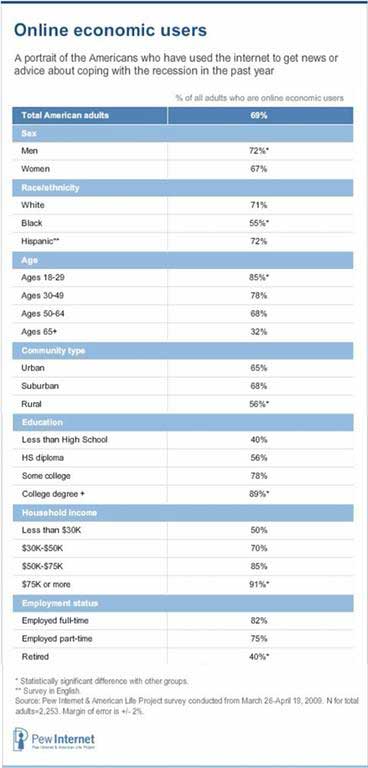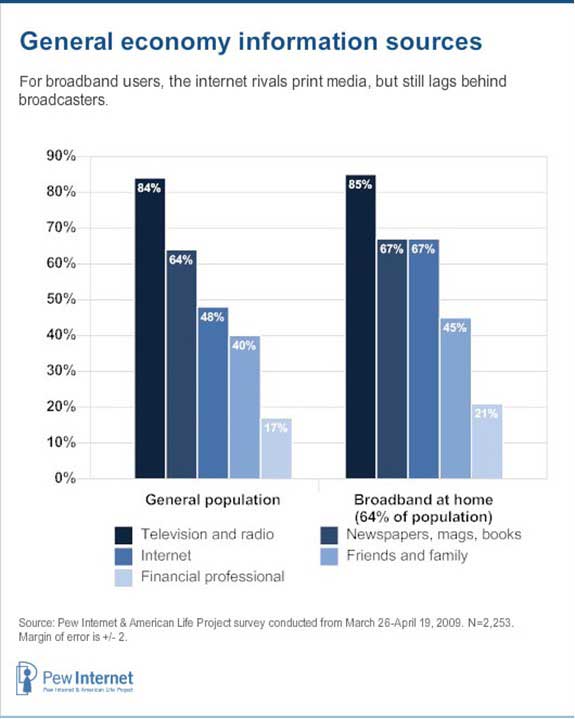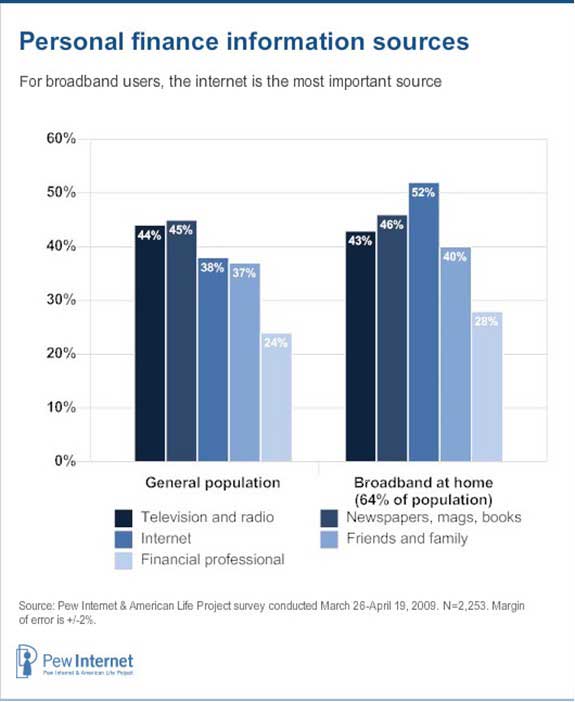Nearly 7 in 10 Americans (69%), or 88% of US Internet users, have used the Internet to cope with the recession—to hunt for bargains, jobs, ways to upgrade their skills, better investment strategies, housing options, and government benefits—according to a new report from the Pew Internet & American Life Project.
Overview
Though the Internet ranks high among sources of information and advice that people are seeking, especially about personal finances and economic circumstances, broadcast media are used more as sources of news about national economics, finds the report titled "The Internet and the Recession."
To meet the challenges of the current economy, most people consult multiple sources of information and support: They "network" with family, friends, experts, and information sources to make sense of the economy and proposed policy solutions.
The 52% of Americans who have been seriously affected by the recession—those whose investments and house values have plummeted, or those who have struggled in the job market—seek information in ways different from those who have not been hard-hit.
On average, Americans are using 2-3 sources of information to make sense of what is happening and plan personal coping strategies. They talk to people, seek updates from media sources like newspapers and broadcast media, and actively search for insights into the economy and how they might adjust.
However, the quest for information and advice online is not intense for most Americans:
- 18% say they search at least once a day for recession-related material.
- About half of Internet users say they get such material every few days or less frequently.
Summary of Findings
The following are among the findings of the Pew Internet study:
Some 52% of Americans have been hard-hit by the recession, having been affected in at least one of the following ways:
- 35% have seen their investments lose more than half their value.
- 27% of those who are employed full-time or part-time have had their pay cut, their hours reduced, or have lost benefits.
- 27% of homeowners have seen the value of their home reduced by at least half.
- 14% have been laid off or lost their jobs in the recession.
The "online economic users," the 69% of Americans (and 88% of Internet users) who have used the Internet for recession-related purposes in the past year, have done so for the following purposes:

- Price comparisons: 67% of online economic users have used the Internet in the past year to find the lowest price available for something they need to buy.
- Job searches: 41% have sought information about jobs that might be available.
- Coupon availability: 40% searched for cost-saving coupons.
- Spending less on everyday items: 27% have sought information on the cost of everyday purchases.
- Earning more money and second jobs: 27% have looked for tips about ways to earn more money or explored prospects for getting a second job.
- Advice about protecting personal finances: 25% have sought information about ways to protect their finances in a difficult economy.
- Improving job skills: 25% have sought material about how to improve their skills to qualify for better jobs.
- Selling personal items online: 23% have used auction or classified ad sites to sell personal items.
- Unemployment benefits: 22% have sought material online about unemployment and other government benefits.
- House values: 18% have checked up on the value of their homes.
- Checking out financial companies and professionals: 17% checked for rankings and reviews of financial firms and professionals.
- Getting a loan: 13% checked out ways to get loans.
- Filing for bankruptcy: 3% looked for information about filing for bankruptcy.
Though most online Americans say their Internet use has not changed much and the things they have done online have not had tremendous influence on their beliefs and actions, a sizeable portion of online economic users report changes in their views and actions:
- More worried, less confident: Asked whether the things they have learned online have made them more confident or more worried about certain things:
- 39% of online economic users said they were more worried about the stability of banks by what they read online, compared with 5% who said they were more confident.
- 37% said they were more worried about the nation's economic future by what they read online, compared with 10% who said they were more confident.
- 36% said they were more worried about their family's future by what they read online, compared with 6% who said they were more confident.
- 17% said they were more confident about their ability to make good decisions about their finances and career after their Internet searches and 14% said they were more worried.
- Improved understanding: 36% of online economic users say the things they have learned online have improved their understanding of the nation's financial crisis, compared with 11% who say they are now more confused.
- Going online more often: 31% say they have been using the Internet more often to get information about the economy in the past year; 10% say they are going online less.
- Going on alert: 13% have signed up to receive updates about general economic news or personal financial issues.
About the study: Pew's "The Internet and the Recession" report is based on the findings of a daily tracking survey on Americans' use of the Internet. The results are based on data from telephone interviews conducted by Princeton Survey Research International between March 26 to April 19, 2009, among a sample of 2,253 adults, 18 and older. A combination of landline and cellular random digit dial (RDD) samples was used to represent all adults in the continental United States who have access to either a landline or cellular telephone.





